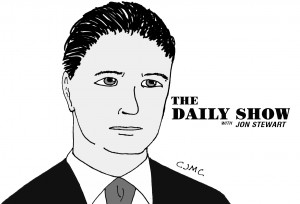On Tuesday, Feb. 10, a comedian employed by one of the largest media corporations in the world announced his retirement, and America collectively mourned.
This employee was Jon Stewart, who, during his tenure on “The Daily Show with Jon Stewart,” which aired on Comedy Central (a Viacom property), ridiculed the absurdities of politics and the news in a way that resonated with many.
Stewart’s tenure on “The Daily Show” marked a (possibly temporary) resurgence in American political humor, though it sometimes crossed into dullness. At its best, “The Daily Show” was a voice of populism–a voice that people could rely on to engage with and transcend the cultural mainstream. Though he frequently lambasted Fox News and the Republican Party, Stewart also found missteps and hypocrisy within MSNBC and the Democratic Party. Stewart will likely be remembered for his roasts of the political right–a hallmark of the show that seemed, at times, just as big a draw to the show as Stewart himself. The show won 18 Emmy Awards in the 17 years that it aired on Comedy Central and spawned a number of spin-offs. Stephen Colbert, a former correspondent on the show, went on to create a successful spin-off, “The Colbert Report,” and will be hosting “Late Show with Stephen Colbert” on CBS later this year. John Oliver, another former correspondent, has gone on to host “Last Week Tonight with John Oliver,” a half-hour show that has aired on HBO since April 2014.
You knew what you were getting into when you watched “The Daily Show”: on a channel where cheap laughs and groans were often the draw, Stewart and his writers pivoted the show’s draw to Stewart himself. The monologues were the show’s magnet; unlike the segments that featured correspondents in front of green screens, Stewart speaking straight into the microphone was more than just a meta-commentary on the news that worked–it was also a way to connect with a comedian who unafraid to admit that he was human.
Throughout his tenure, Stewart was Cronkite with a bite–a satirist not afraid to punch the audience, and politicians, in the gut. Stewart presented the best and (frequently) the worst of politics and news in a way that will be unforgettable to this generation. Stewart will be remembered for providing a voice of discontent–a voice that did not pose as pretentious or unfrustrated– to a generation in which discontent is all the rage. But, in his most pious moments, Stewart broke down the barrier between actor and audience; he became one of us. And sometimes, that’s all we can ask for from a television personality.
Schaffer is a member of the class of 2016.






